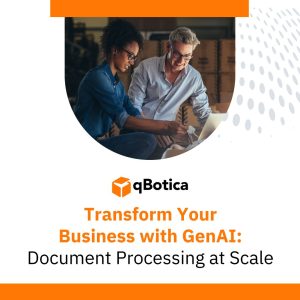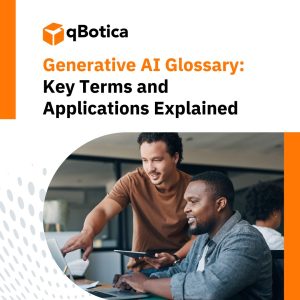Generative AI is the latest advancement in the field of artificial intelligence and it is taking the world by storm! With the ability to create unique content such as text, videos, images, and even 3D models out of simple, humanly given prompts, generative AI has vast applications in almost all fields of life, and healthcare is no exception!
Tech developers, partnering with medical researchers, have already been designing tools that can assist healthcare providers in giving better and more accurate diagnoses, analyzing patient records and post-treatment recovery, and drug selection and administration.
One such AI-powered tool, that has even been approved by the FDA, is Luminetics Core. This powerful tool, developed by Digital Diagnostics, detects diabetic retinopathy and is nothing less than a milestone in the application of AI in the healthcare sector. Many similar tools with a wider range of applications are under development as of now!
Not just in diagnosis, but medical tech developers are also looking to, and even close to creating generative AI tools that can be used in medical research, drug discovery, administrative matters, patient communication, and surgical simulation. This can potentially transform the healthcare field and help save thousands of lives!
In this blog post, we are going to have a look at how generative AI is revolutionizing healthcare. In addition to that, we are also going to discuss its various applications and positive impacts on the medical sector! So stay with us till the end!
Generative AI – An Overview
Before we indulge further, let’s have an overview of generative AI. Traditionally, AI is used to analyze data and solve problems but generative artificial intelligence or generative AI can produce unique content based on its past learning. This form of AI works on large Language Models, commonly known as LLM, and mimics human intelligence.
Generative AI recognizes and adopts patterns and structures in existing data and uses this learning to create new content such as texts, images, 3D printable models, and even videos! During development, a generative AI tool is fed with colossal amounts of data and it learns patterns in this data to create fresh, unique content when given prompts.
Although still in its developing stage, generative AI has found its application in almost all fields of life, particularly finance, art and design, product development, education, consumer businesses, administration, and of course, medicine and healthcare.
Major Application of Generative AI in Healthcare
Let’s have a look at some major applications of generative AI in the healthcare sector.
#1. Diagnosis of Diseases
Many healthcare professionals believe that the accurate application of generative AI in disease diagnosis will prove to be a major breakthrough in the field of medicine, and rightly so. Generative AI, no doubt has the ability to precisely and efficiently diagnose diseases based on its learning of colossal amounts of medical and patient data.
You’ll be amazed to know that ChatGPT can pass almost all professional medical exams including the United States Medical Licensing Exam. This is possible due to its ability to learn from large amounts of medical data and generate accurate answers.
As discussed earlier, many such AI-powered tools are under development which will revolutionize healthcare and make disease diagnosis easier for doctors. Not only will it make the recognition of diseases more efficient and accurate but this will also help save thousands of lives through early diagnosis. You can learn more on the topic by visiting Qbotica’s official web page.
#2. Medical Research and Discovering Drugs
It takes years of medical research and billions of dollars in investment to discover, test, and release a new medicinal drug on the market. A major portion of the process involves combining and testing various molecular formulae till one of them gives desirable results. Generative AI, by recognizing patterns can help shorten this process and help save endless hours of research and large amounts of finances.
In addition to that, generative AI can greatly aid in minimizing the production costs of different life-saving drugs and make their supply much more efficient to people who need them!
#3. Creating Personalized Treatment Plans
Generative AI has the capability to create patient-specific treatment plans that will produce ideal results and fast recovery. A particular patient can have their specific needs and it can be quite difficult and time-consuming for a health care professional to tailor the optimal treatment plan based on these needs.
With the help of generative AI, creating optimal and effective treatment plans will become much easier. Artificial intelligence can analyze drug administration results, recognize recovery patterns, and evaluate other vital data of a particular patient to create the best, most effective treatment plan for them.
Visit Qbotica’s official website right now to learn more about how artificial intelligence can benefit the healthcare sector and especially the patients!
#4. Medical Study and Surgical Simulation
Generative AI has vast applications in medical study and surgical simulation. Generative AI can be used to create authentic surgical simulations to help medical students improve their decision and response time to various problems. In addition to that, generative AI can create complex medical cases and problems for students to test their learning and help them develop their skills.
#5. Clinical Documentation and Administration
Clinical documentation is a very time-consuming procedure and generative AI can help medical professionals save hours which they can spend on more important tasks such as treatment planning and drug selection. In addition to that, generative AI can have a direct impact on administration and can help hospitals better manage their patients, medical records, and their employees.
Final Thoughts – Generative AI Revolutionizing Healthcare
Generative AI is a powerful new technology that has the potential to completely revolutionize healthcare. It can be used to improve diagnosis, drug discovery, and treatment planning, as well as medical education and surgical simulation. Even though generative AI is still in its early stages of development, it still has the potential to make a significant impact on healthcare in the years to come.




